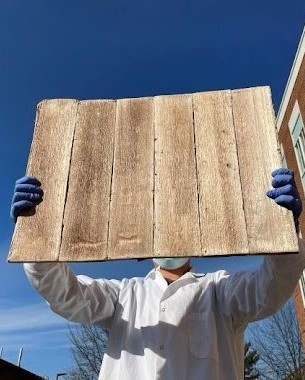News Story
Insulwood for better sound and thermal insulation

High-porosity structures (> 0.9) are effective at attenuating sound energy and decreasing thermal transport, which are desirable features for construction materials to decrease noise and retard heat-loss through walls and roofs. However, such materials are typically composed of petroleum-based foams (e.g., polyurethane and expanded/extruded polystyrene foams) or mineral-based wools, which generate pollutants during manufacturing (e.g., SOx and NOx) and may have potential health impacts caused by the inhalation of micro-sized fibers and particles. Additionally, the fabrication of these traditional construction materials typically involves high-temperature processes, which produce significant carbon emissions.
Recently, an interdisciplinary and multi-institutional research team, led by Liangbing Hu, Herbert Rabin Distinguished Professor of Materials Science and Engineering (MSE) at the University of Maryland (UMD) and director of the Center for Materials Innovation (CMI), and Miao Yu, Professor of Mechanical Engineering at UMD, developed a scalable, highly porous, and cost-effective material called “insulwood” for thermal insulation and noise reduction in buildings. Insulwood is derived from wood, in which the natural lignin and hemicellulose are removed while still retaining the natural structure of the hierarchically aligned cellulose fibers through a rapid, top-down process that takes just one hour. This study was published in Nature Sustainability on January 9, 2023. Dr. Xinpeng Zhao and Dr. Yu Liu, two Postdoctoral Associates in the MSE department at UMD, are the leading researchers.
Insulwood features a high porosity of > 0.93, a low thermal conductivity of 38 mW/(m·K), and a high compressive strength of 1.5 MPa that is up to 20-times stronger than conventional porous materials. Additionally, the sound absorption coefficient of insulwood is ~10-times higher than that of natural wood and 2–5-times greater than conventional porous materials.
This newly developed, affordable, and sustainable cellulose-based insulwood with low thermal conductivity, high sound absorption, high mechanical strength, and reduced CO2 emissions can replace conventional porous materials in construction applications (e.g., walls, roofs), cold-chain transportation, and industrial manufacturing (e.g., thermal energy storage, oil pipe insulation).
Nature Sustainability: https://doi.org/10.1038/s41893-022-01035-y
Published January 11, 2023









